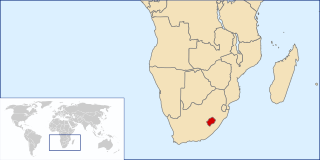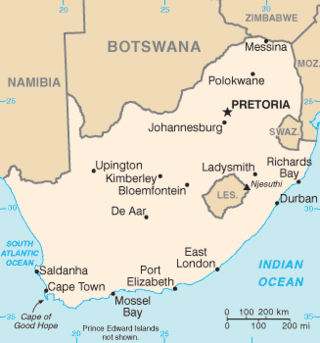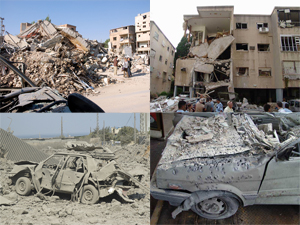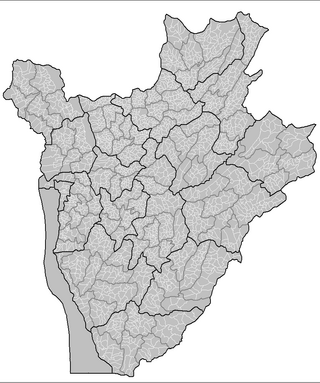
Transkei, officially the Republic of Transkei, was an unrecognised state in the southeastern region of South Africa from 1976 to 1994. It was, along with Ciskei, a Bantustan for the Xhosa people, and operated as a nominally independent parliamentary democracy. Its capital was Umtata.
United Nations Security Council Resolution 283 was a United Nations Security Council resolution adopted July 29, 1970. It was adopted by 13 votes to none, with France and the United Kingdom abstaining.
United Nations Security Council Resolution 309, adopted on February 4, 1972, after reaffirming previous resolutions on the topic, the Council invited the Secretary-General, in close co-operation in a group of the Council composed of representatives of Argentina, Somalia and Yugoslavia, to initiate as soon as possible contacts with all parties concerned to enable the people of Namibia to exercise their right to self-determination and independence. The Council called upon South Africa to co-operate and requested the Secretary-General to report back no later that July 31, 1972.
United Nations Security Council Resolution 310, adopted on February 4, 1972, after reaffirming previous resolutions on the topic, the Council strongly condemned repressive measures against the African laborers in Namibia and called upon all nations and corporations operating in Namibia to use whatever means available to ensure that operations there conform to the Universal Declaration of Human Rights.

United Nations Security Council Resolution 402, adopted on December 22, 1976, after hearing from the Minister of Foreign Affairs for Lesotho, the Council expressed concern at South Africa's decision to close the border with Lesotho in many areas in an attempt to pressure the country to recognise the "independence" of the bantustan Transkei. After recalling previous resolutions, the Council praised Lesotho for not recognising Transkei and stated it will organise economic assistance to the country from the organisation itself and other countries to help it overcome the blockade by South Africa.

United Nations Security Council Resolution 434, adopted on September 18, 1978, after reaffirming previous resolutions, including 425 (1978), 426 (1978) and 427 (1978), the Council commended the United Nations Interim Force in Lebanon for its work in Southern Lebanon, but expressed concern for the situation in Lebanon as a whole. The decision came in the context of the Lebanese Civil War and Palestinian insurgency in South Lebanon.

United Nations Security Council Resolution 439, adopted on November 13, 1978, after recalling resolutions 385 (1976), 431 (1978), 432 (1978) and 435 (1978), the Council condemned South Africa for its decision to proceed unilaterally with elections in Namibia in contravention of previous resolutions. The Council considered this a clear defiance of the authority of the United Nations.

United Nations Security Council resolution 527, adopted unanimously on 15 December 1982, having heard representations from Moshoeshoe II of Lesotho, the Council condemned, alongside a General Assembly resolution, an attack by South Africa on Lesotho, resulting in damage and the deaths of 40 people.

United Nations Security Council resolution 532, adopted almost unanimously on 31 May 1983, after hearing a report from the Secretary-General and reaffirming resolutions 301 (1971), 385 (1976), 431 (1978), 432 (1978), 435 (1978) and 439 (1978), the Council condemned South Africa's continued occupation of Namibia, then known as South West Africa. All voted in favour other than France, who abstained.

United Nations Security Council Resolution 535, adopted unanimously on June 29, 1983, after examining the report of the Mission to Lesotho commissioned in Resolution 527 (1982), the Council reaffirmed its opposition to apartheid, commending Lesotho for providing sanctuary to refugees from South Africa.

United Nations Security Council Resolution 545 was adopted on 20 December 1983; after hearing representations from the People's Republic of Angola, the Council recalled resolutions 387 (1976), 428 (1978), 447 (1979), 454 (1979) and 475 (1980), and expressed its concern at the continuing attacks on the country by South Africa through occupied South West Africa.

United Nations Security Council resolution 546, adopted on 6 January 1984, after hearing representations from the People's Republic of Angola, the council recalled resolutions 387 (1976), 428 (1978), 447 (1979), 454 (1979), 475 (1980) and 545 (1983), and expressed its concern at the continuing attacks on the country by South Africa through occupied South West Africa.

United Nations Security Council resolution 580, adopted unanimously on 30 December 1985, having heard representations from Lesotho and recalling Resolution 527 (1982), the Council condemned the recent attacks on the Kingdom of Lesotho by South Africa, resulting in loss of life and damage to property on 19 December, in which several South African refugees were murdered in Lesotho's capital Maseru by the South African Defence Force.

United Nations Security Council resolution 765, adopted on 16 July 1992, after recalling resolutions 392 (1976), 473 (1980), 554 (1984) and 556 (1984), the council condemned the escalating violence in South Africa, in particular the Boipatong massacre on 17 June 1992, which resulted in the deaths of 46 people, and the suspension by the African National Congress (ANC) of bilateral talks with the South African government.

United Nations Security Council resolution 1013, adopted unanimously on 7 September 1995, after recalling resolutions 918 (1994), 997 (1995) and 1011 (1995) on the situation in Rwanda, established an international commission of inquiry concerning arms flows to former Rwandan government forces in the Great Lakes region of Africa.

United Nations Security Council resolution 1182, adopted unanimously on 14 July 1998, after reaffirming resolutions 1125 (1997), 1136 (1997), 1152 (1998), 1155 (1998) and 1159 (1998) regarding the situation in the Central African Republic, the Council extended the mandate of the United Nations Mission in the Central African Republic (MINURCA) until 25 October 1998.

United Nations Security Council resolution 1366, adopted unanimously on 30 August 2001, after reaffirming resolutions 1196 (1998), 1197 (1998), 1208 (1998), 1265 (1999), 1296 (1999), 1318 (2000), 1325 (2000) and 1327 (2000) concerning aspects of armed conflict, the Council reiterated its aim to prevent armed conflict as part of its responsibility to maintain international peace and security.

United Nations Security Council resolution 1561 was adopted unanimously on 17 September 2004, after recalling all previous resolutions on the situation in Liberia, particularly resolutions 1497 (2003), 1503 (2003), 1521 (2003) and 1532 (2004). The Council extended the mandate of the United Nations Mission in Liberia (UNMIL) for a further year until 19 September 2005.

United Nations Security Council Resolution 1650, adopted unanimously on 21 December 2005, after recalling Resolution 1545 (2004) regarding the situation in Burundi, the Council extended the mandate of the United Nations Operation in Burundi (ONUB) until 1 July 2006.

United Nations Security Council Resolution 1714, adopted unanimously on October 6, 2006, after recalling previous resolutions on the situation in Sudan, particularly resolutions 1590 (2005), 1627 (2005), 1653 (2006), 1653 (2006), 1663 (2006), 1679 (2006), 1706 (2006) and 1709 (2006), the Council extended the mandate of the United Nations Mission in Sudan (UNMIS) until April 30, 2007.














